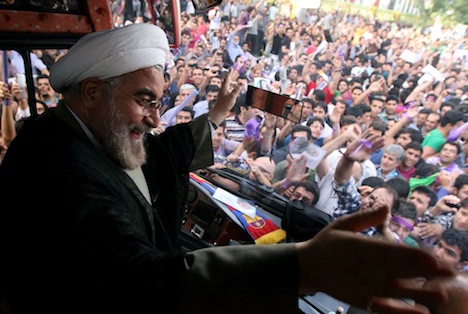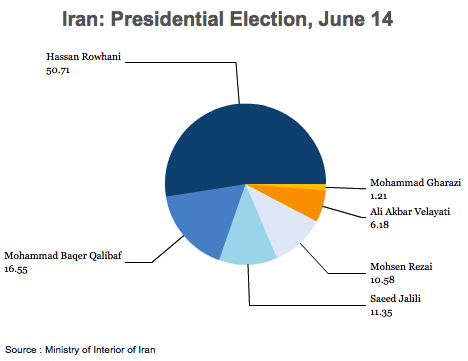Hassan Rowhani, the moderate cleric and former Iranian nuclear negotiator, has won a first-round victory in Iran’s presidential election, a stunning development that, despite evidence of Rowhani’s surge, no one predicted even 24 hours ago.![]()
The victory was so stunning over a divided field of more conservative ‘principlist’ candidates that it calls into question the strategy of leading principlists to have remained in the race so long, thereby dividing conservative support and prohibiting the emergence of a single principlist standard-bearer.
With all of the votes counted, Iran’s ministry of the interior reports a turnout of just over 72% in the race, and Rowhani’s 50.71% support is sufficient to avoid a runoff with Tehran mayor Mohammad Baqer Qalibaf on June 21:
It’s no surprise that Qalibaf finished in second place, given the fact that he has a strong base of supporters in Tehran, where he’s served as mayor since 2005 and has been twice elected by the city council, and that he’s long been a critic of the administration of outgoing president Mahmoud Ahmadinejad.
The two candidates most associated with Supreme Leader Ali Khamenei — current nuclear negotiator Saeed Jalili and longtime former foreign minister Ali Akbar Velayati — did even worse, despite reports that proclaimed Jalili a ‘frontrunner’ in the campaign. Jalili, with just over 11% of the vote, only narrowly outpaced third-time candidate Mohsen Rezai, the former head of the Revolutionary Guards who’s popular with rural Iranian voters. Velayati finished far behind in fifth place with just 6.18% of the vote.
Meanwhile, Rowhani has consolidated the support of three main groups in Iran: reformists, moderate conservatives, and voters disillusioned with the outgoing Ahmadinejad’s failures on economic growth and international relations. Continue reading Moderate cleric Rowhani wins stunning first-round victory in Iran presidential election

